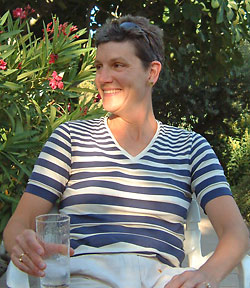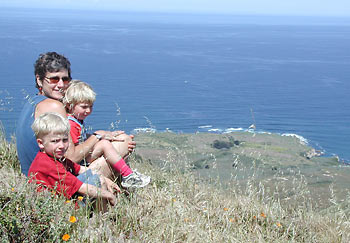UC Berkeley Press Release
Jean O. Lanjouw, associate professor of economics, dies at 43
BERKELEY – Jean O. Lanjouw, associate professor of economics at the University of California, Berkeley, died of cancer on Nov. 1, within just a few months of learning of her diagnosis. She died in Washington, D.C., where she shared a home with her husband and two children. She was 43.
 Jean Lanjouw (Photos courtesy the Lanjouw family) |
Lanjouw's research focused on assessing and addressing the plight of the poor in developing countries, both through methodological work in poverty measurement and through detailed study of how specific mechanisms - such as intellectual property rights in the pharmaceutical sector - affect the poor's accessibility to important drugs.
In addition to her faculty appointment in UC Berkeley's Department of Agricultural and Resource Economics, Lanjouw had fellowships at the Brookings Institution, the Center for Global Development in Washington, D.C., and the National Bureau of Economic Research. She consulted for the World Bank, the United Nations Development Program and statistical organizations in South Africa and Brazil. She advised trade negotiators for a wide variety of countries and participated in a number of international debates on drug access in developing countries.
Working with colleagues including her husband, World Bank economist Peter Lanjouw, she worked to understand and counteract poverty in developing countries by quantifying poverty and inequality in neighborhoods or towns, and studying the role of property rights in these areas.
In Jean Lanjouw's research and in many of her policy proposals, she examined the degree to which patent litigation served as a barrier to entry into innovative, high-tech industries, and how patents provide incentives for research and development. Her research on international issues examined the effects of the World Trade Organization requirement that forced many developing countries to introduce pharmaceutical patents. Based on her research, she developed a policy mechanism that would create a global patent system tailored to differences in countries' development levels and to the importance of product markets.
Toward the end of her life, her work on how to finance pharmaceutical innovations for developing countries began to attract substantial attention throughout the world. Her proposal for a mechanism that would permit the poorest countries in the world to preserve access to drugs at the lowest possible cost, without compromising their adherence to global patenting agreements, was widely disseminated and discussed on the pages of The New York Times, Washington Post, Wall Street Journal and Financial Times, as well as in the World Development Report 2006 on Equity and Development.
Bronwyn Hall, professor of economics at UC Berkeley and one of the world's most respected researchers on intellectual property, said Lanjouw "was always a heroine of mine - with her boundless energy, positive outlook and the effort she devoted to the crusade for generics in the third world."
Dr. Berk Özler of the World Bank's Development Research Group observed that Lanjouw "was passionate to turn the ideas in her academic research into reality. She traveled tirelessly from India to Switzerland, Berkeley to the Research Triangle, and to the Congress in Washington, D.C., to promote better access to generic drugs in poor countries."
Lanjouw, known as "Jenny" by friends and colleagues, was also an empathetic and effective teacher who is sorely missed by her students. Students praised her friendliness, her use of extremely recent material, and her sharing of her own research and public policy experiences.
 Jean Lanjouw with her two children, Max, 6, and Else, 3, in Big Sur. |
Lanjouw obtained her A.B. in mathematics and economics, summa cum laude, from Miami University, attended the master's program in economics at the Delhi School of Economics in India, and received both her M.Sc. and Ph.D. in economics from the London School of Economics. Before her appointment at UC Berkeley in July 2003, she was a faculty member in the economics department at Yale University.
In addition to publishing her work in a wide variety of academic journals, Lanjouw organized several conferences on patent reform and statistics. She was also an honorary fellow at the Amsterdam Institute for International Development and an associate editor for the journal Economic Development and Cultural Change.
Lanjouw is survived by her husband, Peter, of Washington, D.C.; daughter, Else, 3; and son, Max, 6.

